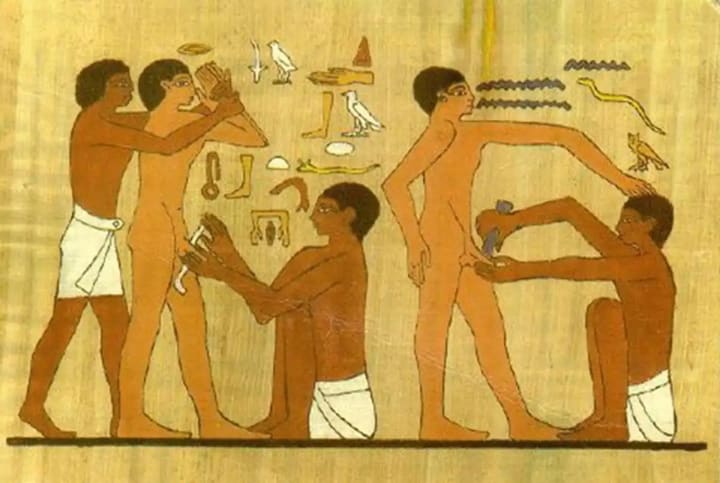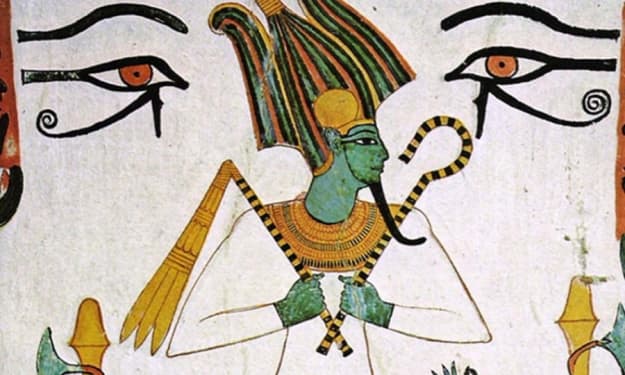
Ever notice how so many movies or TV shows reference ancient Egypt when there’s some mystery? When this happens in my house, I casually remind everyone, “It all goes back to the Egyptians.” Their eyes roll at this frequently mentioned phrase as I proceed to explain how Egypt basically created everything.
It’s just like Gus Portokalos from “My Big, Fat, Greek Wedding” who really believed modern civilization owed everything to the Greeks. Not that there’s anything wrong about being proud of your country of origin, but come on, who isn’t fascinated by the pharaohs?
I looked at this challenge and decided this was my chance to play Gus Portokalos and share five little known facts about the sex life of the ancient Egyptians.

Oedipus Complex
Pharaohs tended to ‘keep it in the family’ and sometimes married their sisters in order to keep the bloodline ‘pure’. One particular ruler just took it one step further and married his mother.
Three thousand years ago, Akhenaten – the “Mystic Pharaoh” – erased all traces of his father’s rule from history (hey, at least he didn’t kill him) and married his mother Tiy, a beautiful Nubian woman. That kind of makes him the prototype for Oedipus, the Greek prince (see Gus, we came first!). His second wife was his maternal cousin, Nefertiti. Maybe the only difference between him and Oedipus is Akhenaten did not feel guilty.
His son, the boy pharaoh Tutankhamun, followed in his father incestuous footsteps and married his half sister. You probably heard of “King Tut” and the discovery of his intact tomb. Now you know a bit more about him. Kinda cringy, right? Pass that fun fact on to your unsuspecting Trivial Pursuit partners, or random strangers. It’s great for making friends.
Every time, I hear someone mention the Oedipus complex, I remind them it was probably modeled after an Egyptian king.

Circumcision
Trigger warning: this fact might make you male readers out there a bit uncomfortable. Before Hebrews made circumcision an article of faith, it was practiced in Egypt. Could it be that Hebrews brought it back from Egypt during the exodus?
Thankfully, Israel’s lawgivers made a significant improvement in circumcision rules. See, in Egypt it was a puberty rite when the boy reached adolescence. Fortunately, the Israelites decided it would be more appropriate for infants. Of course, not everyone agrees with the practice, but I say live and let snip, if that’s your thing.

Contraception
Ladies, if you’ve ever experienced discomfort with your sanitary products (and let’s face it, we all have), you would have been grossed out with how early Egyptians used linen pads and crocodile-dung as makeshift diaphragms. Yes, you read that correctly.
The Kahun Papyrus, the earliest surviving medical work from Egypt (dating back to 1900 BCE) included ‘recipes’ for homemade contraception. The first recipe featured crocodile dung with Auyt (a type of natural gum) and the second one included a glutinous compound of honey and natron (sodium carbonate) harvested from dried lake-beds. The recipes had an absorbent texture that soaked up seminal fluid.
According to the Papyrus Ebers, Egyptian women also used a pad of lint smeared with a mixture of acacia tips and honey to block the opening of the uterus. Now that’s a climate-friendly green solution!
Still, while we have records showing the Pharaohs had all these methods, we don’t have proof they actually worked. At least they tried.

Diagnosis of disease
According to the Kahun Papyrus, Egyptian physicians identified many ailments, including the gynecological and obstetrical types. It even cited cases where men were, um, “incapable of doing their duties”. Their words, not mine!
They knew how to cure STDs but couldn’t figure out exactly why they spread so easily between multiple partners (cell biology didn’t come along until a few thousand years later). That’s right, I said multiple partners. Foreign slaves were frequently used for satisfaction and the poor didn’t marry since they lived communal lives. Plus, troupes of musicians and dancers were well known to provide sex on the side for audience members – for a fee, of course.
Monogamy was largely unknown in ancient Egypt. They didn’t have the swingers’ clubs we have today because everyone got busy with each other. Those old-timers made the “free-love” sixties look like an amateur show.
Pregnancy Testing
Four thousand years ago, Egyptians commonly used pregnancy tests – without the need to make an awkward transaction with the local apothecary.
So the story goes that an Egyptian doctor would put barley and wheat seeds in two cloth satchels. The patient would be asked to pass her water on them. If both seeds sprouted, then the test was positive and if the seeds did not sprout, the test was considered negative.
But get this: not only would the pregnancy test confirm pregnancy, it also would indicate the gender! If the wheat sprouted first, then it was a boy. This probably was because wheat was valued more. If barley sprouted first, the mother knew she was giving birth to a girl.
To this day we don’t know if the sprouts were planted and later eaten, but it’s fun to think about.
I hope you enjoyed this exhilarating trivia about the ancient Egyptians. You can find more interesting facts about sex in history by my favorite writer, Reay Tannahill, who wrote a book by the same name.
About the Creator
Asiya
Asiya is my Sufi name given to me by Sherif Papa, my spiritual guide. I was born in Cairo, Egypt. I am a spoken word poet. I love writing short stories. Feel free to email






Comments
There are no comments for this story
Be the first to respond and start the conversation.